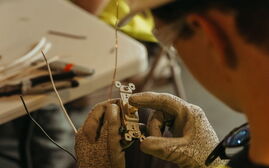Processing Your Payment
Please do not leave this page until complete. This can take a few moments.
- News
-
Editions
-
- Lists
-
Viewpoints
-
Our Events
-
Event Info
- Business Leaders of the Year Reception 2025
- Women's Leadership Forum 2025
- On the Road with Mainebiz in Bethel
- Health Care Forum 2025
- On The Road with Mainebiz in Greenville
- On The Road with Mainebiz in Waterville
- Small Business Forum 2025
- Outstanding Women in Business Reception 2025
- On The Road with Mainebiz in Bath
- 60 Ideas in 60 Minutes Portland 2025
- 40 Under 40 Awards Reception 2025
- On The Road with Mainebiz in Lewiston / Auburn
- 60 Ideas in 60 Minutes Bangor 2025
Award Honorees
- 2025 Business Leaders of the Year
- 2024 Women to Watch Honorees
- 2024 Business Leaders of the Year
- 2023 NextUp: 40 Under 40 Honorees
- 2023 Women to Watch Honorees
- 2023 Business Leaders of the Year
- 2022 NextUp: 40 Under 40 Honorees
- 2022 Women to Watch Honorees
- 2022 Business Leaders of the Year
-
-
Calendar
-
Biz Marketplace
- News
- Editions
- Lists
- Viewpoints
-
Our Events
Event Info
- View all Events
- Business Leaders of the Year Reception 2025
- Women's Leadership Forum 2025
- On the Road with Mainebiz in Bethel
- Health Care Forum 2025
- On The Road with Mainebiz in Greenville
- + More
- On The Road with Mainebiz in Waterville
- Small Business Forum 2025
- Outstanding Women in Business Reception 2025
- On The Road with Mainebiz in Bath
- 60 Ideas in 60 Minutes Portland 2025
- 40 Under 40 Awards Reception 2025
- On The Road with Mainebiz in Lewiston / Auburn
- 60 Ideas in 60 Minutes Bangor 2025
- - Less
Award Honorees
- 2025 Business Leaders of the Year
- 2024 Women to Watch Honorees
- 2024 Business Leaders of the Year
- 2023 NextUp: 40 Under 40 Honorees
- 2023 Women to Watch Honorees
- 2023 Business Leaders of the Year
- + More
- 2022 NextUp: 40 Under 40 Honorees
- 2022 Women to Watch Honorees
- 2022 Business Leaders of the Year
- Nomination Forms
- Calendar
- Biz Marketplace
Wave of the future: Goodwill clinic uses new tech to address brain injuries
 Heather Steeves
Mackenna Murtagh, clinical director of Goodwill NeuroRehab Services, places the NeuroFeedback cap on a client.
Heather Steeves
Mackenna Murtagh, clinical director of Goodwill NeuroRehab Services, places the NeuroFeedback cap on a client.
Heather Steeves didn’t think she would be fighting against her subconscious and a virtual cheetah when she went to work as the communications director on a recent day at Goodwill Northern New England.
Steeves did just that when she had the opportunity to tap into Goodwill's NeuroRehabilitation clinic's new technology called NeuroFeedback.
Goodwill Northern New England is a nonprofit social service organization that operates in Maine, New Hampshire and Vermont. Goodwill NNE's programs also include workforce training programs, 18 group homes that support adults with disabilities, community supports for adults with disabilities and AmeriCorps programs.
Goodwill's two brain injury clinics in Lewiston and Scarborough use the new tech to help people get back to their lives after a brain injury, which can be caused by a stroke or a car accident. The clinic will use NeuroFeedback to treat anxiety, depression, insomnia, and more conditions in a non-invasive way. The technology will also help diagnose autism, schizophrenia and brain injuries without relying solely on self-reported symptoms.
During the session, Steeves wore a cap with electrodes to measure her brain activity during the session. Mackenna Murtagh, clinical director of Goodwill NeuroRehab Services, "set up goals for me on his end (in this case to bring down theta waves, a name for a type of brain wave), and he set up a 'game' for me on my TV screen.
"I got to 'play' a cheetah racing other cheetahs," said Steeves, a self-described Type A, competitive person. "Whenever my brain brought down theta brainwaves, I was rewarded with my cheetah moving forward. Of course, you can't consciously control this — it's all subconscious work. Your brain uses the feedback and figures it out, so your cheetah moves more."
"The only comparison I can make of what it felt like when my brain figured out how to pull down theta was kind of like the 'flow state' athletes describe — being in autopilot in a good, relaxed, effortless way."
Goodwill spent around $60,000 to bring in the technology and more staff time.
"It can be difficult for a patient with a brain injury to describe all of their symptoms and to separate a concurrent diagnosis from their brain injury symptoms," said Murtagh. "For instance, a lack of focus might be a symptom of a concussion, but it could be an undiagnosed ADHD symptom. NeuroFeedback lets us see a clearer picture of what's happening in someone's brain so we can give them the therapies they need."














0 Comments